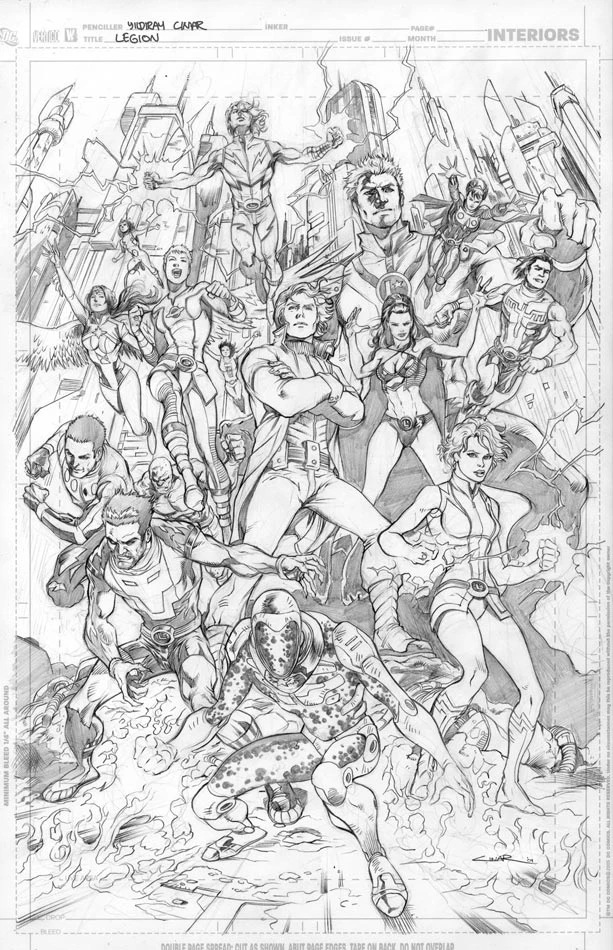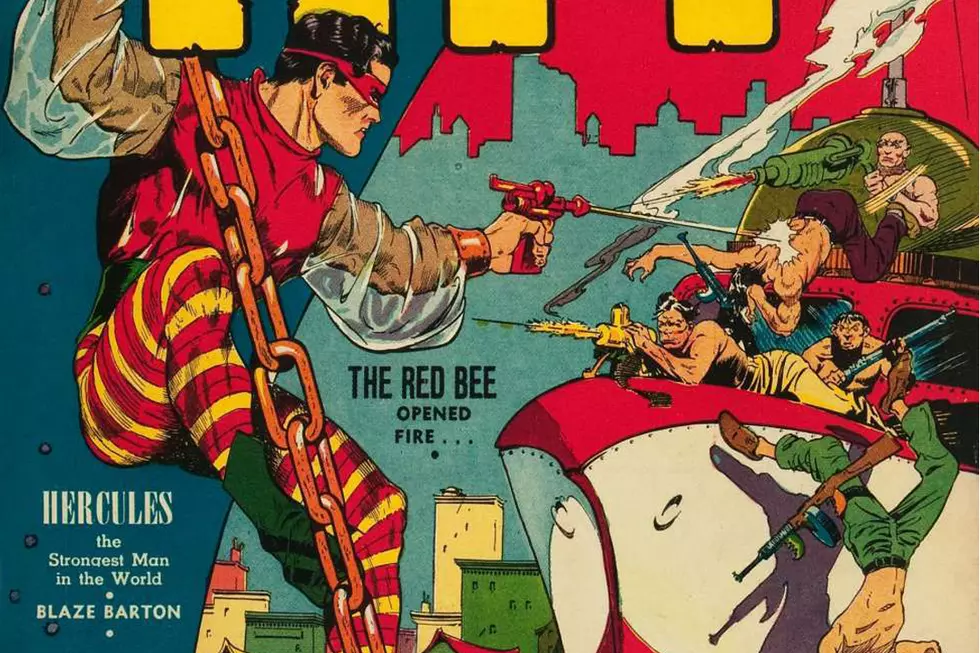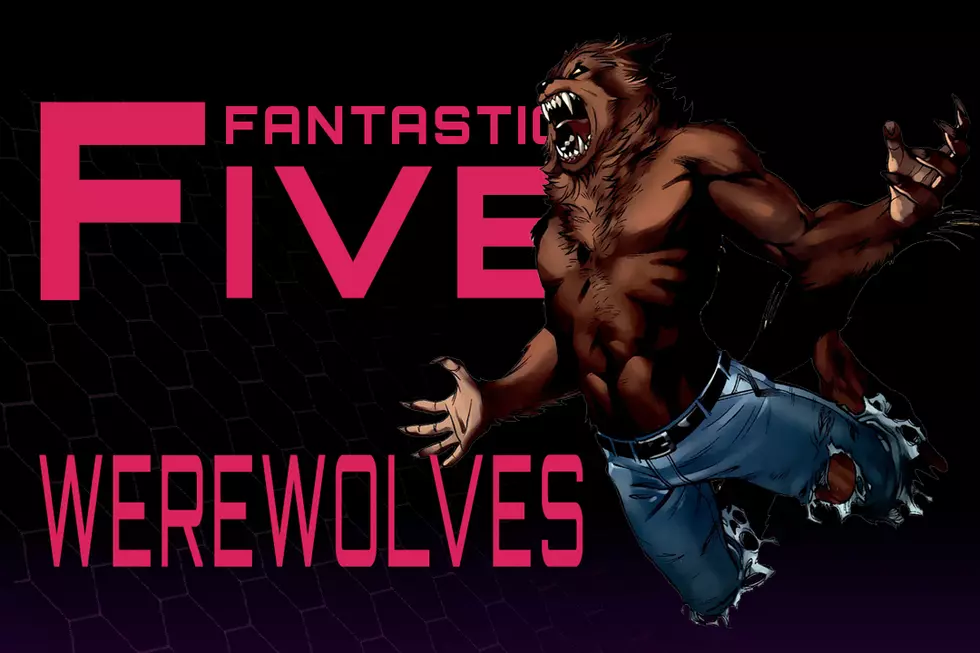
Paul Levitz Goes Back to the Future of ‘Legion of Super-Heroes’
"The Legion of Super-Heroes" is coming back as a brand new comic book in May -- and so is Paul Levitz, who will be returning as the writer of the futuristic superhero comic in with art by Yildiray Cinar, and subsequently taking over the Legion-focused "Adventure Comics" in June. While newer comic book fans might know Levitz best as the President of DC Comics since 2002, older readers will remember him playing another role for much of the '80s: the fan-favorite writer of "The Legion of Superheroes" and some of its most defining stories.
As Levitz prepares to step down from his executive role and focus on writing comic books once more, ComicsAlliance talked with him about what it's like to look into the future of DC's future, his experiences breaking ground with one of the earliest implied lesbian affairs in superhero comics, and the experience of coming back to his most famous comic after over 20 years.

ComicsAlliance: How would you describe the core concept of "Legion of Superheroes," to a new reader of the series?
Paul Levitz: The idea behind the Legion is that it's a group of young people in the far future, a thousand years from now, who are from different planets and with different powers, off saving the universe.
CA: The young adult superhero team is a popular concept, and there are a lot of books on the stands that fit that description. What makes the Legion distinct, to you?
PL: Well, they're young, but they're older than most of the teen teams. They're older, but in a society that presumes that you grow up a little more slowly. So just as we've added [the concept of] adolescence to the process of growing up in the last century, and we seem to be adding "odyssey," as some sociologists call it, to the process of growing up in the current generation, by the time you get to a thousand years [in the future], you're living quite a bit longer, and it's going to be a while before they treat you as a full grown-up. You may even be married and have kids, and they're still not entirely sure you're a full grown-up.
In this science fiction world you've got stuff going on with time travel; you've got interplanetary travel; you have all sorts of envisioned technology in the "Legion," some of which has become real, so we have to leap ahead and remodernize to go further and further forward. It's an incredibly rich and diverse world because we have all these alien planets and the people who come from them, so there's just wonderful weird stuff. Probably most importantly, historically, it's a book that permits change. Most [superhero] comics – I don't care whether they're ours or other publishers – have a real problem with change. Because if you're telling a piece of mythology – I don't care what kind of danger you put her in, you know you're not going to kill Lois Lane.
CA: Superman will always catch her.
PL: Or someone will catch her. Or she'll catch herself. I've got her about to be burned alive as a witch in a "Superman/Batman" arc that I'm doing, and I don't know quite how she's getting out of it yet, but I'm entirely confident she's going to find a way. That makes it hard to get full emotional dimension, because you can't put the person in as much danger; you can't change their life as much. But we've killed Legionnaires. We've killed them and never brought them back, in many cases mercifully. We've married them. We had, in my run, probably the first extramarital affair implied in a DC superhero comic. We had probably the first lesbian affair implied in a DC comic. We had the first case of a superhero executing a supervillain for righteous reasons.
This was years ago and obviously the world has got caught up with it, but hopefully I'll be able to continue that trend to use these puzzle pieces well to create these moments of high drama. You want to get to the moment where something happens that you couldn't do in a lot of books. Superman's not ever going to kill anybody. He shouldn't kill anybody.

CA: So you see yourself continuing to push the envelope in an equivalent way in this new version of the Legion?
PL: Well, I didn't do any of that to push the envelope. I did it initially as characters developed in logical fashion. The lesbian affair that either did or didn't happen in the Legion was how two women got closer together. And a certain community of our readers decided that what happened ultimately turned into a sexual relationship. It's not on-panel. It's not off-panel. I can't tell you for sure what happened.
CA: You don't know?
PL: They began writing themselves, and when I go back and read them I say, "Oh yeah, that's a reasonable interpretation of what happened." Was that in my head that day? It may have been. It may not have been. I can't recreate my mind from that day. Part of what I'm proud of as a writer is if I can still write stories that are textured enough that people are still interested in what happened years later, and are able to say, "In my view, this is what was going on here." And no one says, "Get out of the room, that's old news. Who cares?" Then I've accomplished something. I've made people think about the characters, their personalities and relationships, and I would hope to continue pushing that envelope, where people still care about the guys I write. I certainly wrote many comic book stories that nobody thinks about today. They're in Mylar bags somewhere, buried in a collection because someone had to have every issue of a run. But I'm really proud of the fact that a bunch of things that I wrote years ago still matter to people, and the interpretations of the character still matter. The events still matter. They've provided either critical emotional moments for the character, or things that people wanted to think about.

CA: There have been quite a few different characters in the Legion over the years, to put it mildly. What's the roster going to look like in this new version of the team?
PL: The joy of the Legion is that it's kind of the comic book equivalent to Pokemon – you really need to see the whole chart of their powers and planets. The book can't be written properly without a scorecard. One of its challenges, particularly coming back to it now as a writer, is that there's a lot of stuff. And if I'm talking to a potential new reader who is not a new Legion fan, they might say, "Give me the simple [summary], the six characters who are going to be showing up, and why I'm going to have a good time reading this book."
But it's a deep dive, and I'm doing my best to simultaneously provide a comfortable way in for a new reader coming in, who has been enjoying the DC Universe and seeing these guys pop up in a couple of different places like "Legion of Three Worlds" and Geoff [John's] "Superman and the Legion [of Super-Heroes]" arc. If I'm doing my job right, you should be able to come in cold. You're not going to know everything that's in there, but you shouldn't be stopped by anything that's in there.
There are six or seven new faces in the course of the new issue, some of whom will end up as Legionnaires, some of whom will end up as corpses, some of whom are just dressing. You shouldn't know whether they're old character or new characters, necessarily. And you should be curious. I want to show off the rich texture of it so that as you're around it, you'll say, "I don't know what all this stuff is, but it looks like it'll be interesting if I get to play with all those toys." But the guy sitting next to you who was reading "Legion" ten years ago... will keep seeing all these Easter eggs and say, "Oh, I know what he's doing over there! That's going to lead to something strange." And if I can pull that balance off, it'll be fun.
The first story begins with Saturn Girl, who is a founding Legionnaire and has had some play in the current stories, and by picking up on what happened to Earth Man, a character that Geoff [Johns] developed from preexisting pieces and who was the center of the "Superman and the Legion [of Super-Heroes]" arc. He becomes, in many ways, the emotional center point of the arc to come. And it picks up on Sodam Yat, the "last" Green Lantern from Geoff's stories, with Green Lantern being a particularly important part of the DC Universe at the moment.
CA: Are there any particular "Legion" runs or collections that you would recommend to someone who picks up this new series and wants to read more?
PL: That's really the genesis of the ["Superboy and the Legion of Super-Heroes: Secret] Origin" cycle [in "Adventure Comics"]. Geoff [Johns] challenged me to say that there isn't a single book to give to someone to let them fall in love and learn the Legion's world. So why don't you build one? And I'm not sure it's possible, but that's what I'm trying to do here. The rest of it is challenged by its age. It clearly was viewed as great material for the time, and I so pleased that when CBR did the Top 100 stories, my Great Darkness of Legion story placed #11. That astounds me for a story that is now 24 years old, and hasn't been continually in print.

CA: As you're returning to the book over 20 years later, how different does it feel to be writing "Legion," particularly in terms of how comic books have changed during those years?
PL: The fundamentals of storytelling are still the fundamentals of storytelling. The stylistics tics of the time change radically. We used a lot of background captions in my '80s run, citing things like "The Encyclopedia Galactica" or "Hudson's Guide to Metropolis on 39 Cents a Day." That's not a common tool now, so I've walked away from that for the moment. Thought balloons have gone the way of all things, but the monologue caption has replaced them in many ways. It's a little different in tone... Pacing is a little different; cuts are a little different. And the audience is more sophisticated.
When I was writing "Legion" 20 years ago, it probably had an average audience that was as old and as knowledgeable about the world as anything DC was publishing. I'd get letters explaining how I'd misused a black hole from a physics professor. But as I watched my kids grow up in the ensuing years, we're now dealing with a generation that's enormously more socially sophisticated. So even if the chronological age of the readers hasn't changed since the last time I was writing it, their knowledge of things has changed – what they're interested in; what they've read. And that hopefully allows you to do a whole host of other things.
Certainly the presumed knowledge someone has of the DC Universe is higher, because you've now built all these pieces together. So if you start introducing something [from] a 20-year-old but important story, you don't have to put a caption in that says "go look this up." They'll Google it in three seconds flat if they happen not to know it and they care, or more likely they'll already know it from some "Crisis" crossover an hour before.
CA: Given that "Legion" is such a futuristic book, will the rapid, real-life technological advancements that we've seen over the last couple decades influence how you approach it?
PL: Hopefully. Hopefully you're trying to be a bit of a futurist and figure out how it all works. Historically, the Legion have lived in a future designed [based] on the Golden Age of science fiction, which is that the US model is going to subsume the Earth and conquer the stars. It will be the United States of the Universe, and all the problems [will disappear], and everyone will be happy, thank you very much. Girls not so much – they were still in their corner. And there were aliens, but [the attitude was] really, do we need the other races?
That modernized a bit by the time I was doing it, thank god. One of the things that's been introduced in recent years, particularly in Geoff's work, has been the idea of some rampant xenophobia going on, which I think is a wonderful metaphor for the dilemma that we're facing as a society. Because if we don't figure out how to get along with each other and get past this goddamn labeling thing, we're not going to be here a thousand years from now. A major theme of the first couple of arcs – with Earth Man embodying it, in many ways – is the journey between xenophobia and possible enlightenment, or else destruction.

More From ComicsAlliance









